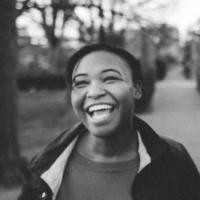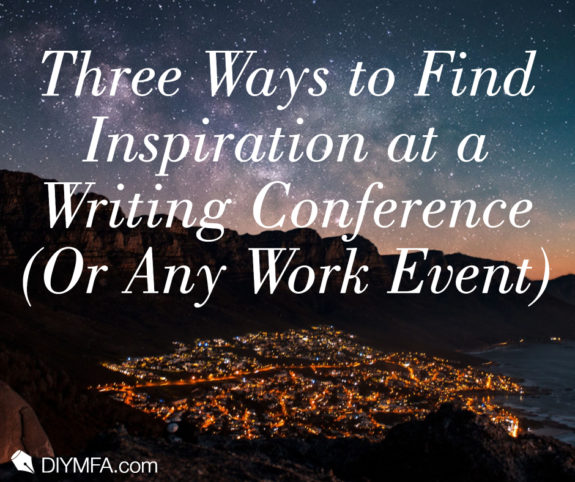This year, I’ve been to more conferences than I’ve ever been to in my whole life; three have been writing conferences for me and one a work conference for my husband. And during each of these, between learning and mingling, I found myself feeling inspired and a bit more creative. So, after the latest writing conference I returned from, Writer’s Digest in New York City, I sat down and thought about what all of these work events have in common that managed to pull some amount of creativity out of me. And here’s what I found:
Every single person that I talked to, no matter for how long, was telling a story. And stories are excellent ways to get inspired.
Whether for a current project or something completely new, being in community and engaging with others can be an incredible tool to spur your imagination. It’s the people that get the wheels of your mind turning, especially when both of you are in an unfamiliar environment with somewhat unfamiliar people (i.e. a work event).
So, the next time you’re at a writing conference, talk or even a happy hour, try a few of these techniques.
1) Pay close attention to how someone talks about their story
Think back to the work events you’ve been to in the past. What’s the one thing that happens time and again, without fail? The swapping of stories. Whether it’s about the work that you’re all doing, where someone is from, or how they got to where they are now (standing in front of or sitting next to you), everyone has a story. And there’s a great deal you can learn from them and apply to your own writing.
For the very next person you meet at your next writing conference, try paying close attention to how they tell their story. What types of inflections do they use? Are they giving you a general overview or focusing in on select details? Why do you think that is? Are there any details you notice are left out of their story? Think again about why that could be. Because oftentimes it’s what we leave out that says the most about us.
Additionally, note how they stand, where they’re facing and if you notice any sort of ticks they have when they speak. After you’ve finished with that interaction, take a few minutes to write down your observations, either on a notepad or somewhere in your phone. These notes can serve as great creative fodder for how your characters interact with one another and their environments.
2) Try telling your story differently each time you meet someone new
After you’ve done some observing of the people around you, take a look back through the list you made and note the ones that really stuck out and inspired you. Now, take your turn and try out different ways of telling your story. It could be a different tone of voice or movement of hands when you speak. Whatever it is, apply what you’ve learned and observed to your next interaction to see how your audience responds. It could be just what you need to inspire more realistic interactions in your writing.
But take notes on yourself, too. Especially when you notice someone really responding. Are they more engaged with what you have to say after making a few adjustments to how you tell your story? Have they stepped closer to you or further away? Do they seem focused on your words and what you’re saying or are they just going through the motions of a work event? At the Writer’s Digest Conference, I noticed that those I spoke with became more engaged in what I was talking about when my tone was more passionate than when it was skewed more uncertain and intimidated. Every observation and interaction is a learning opportunity to add to the creative tools you already have.
3) Take a writing break during the event
Another thing that ended up being really great for my creativity at this last writing conference was taking breaks during the event to be alone and write. If there were sessions I wasn’t particularly interested in, I had to learn that it was alright for me not to go and instead flex my creative muscles a different way. So, whenever that came up at Writer’s Digest, I went back up to my hotel room and took writing breaks. Got out my laptop and wrote down whatever came to me, however many words ended up on the page. During that weekend, I was able to write and work through a scene in the novel that I’d been stuck editing for a few weeks.
If you can find a chunk of time at your work event to be alone, try using it as a break to measure what level your creativity is at. You won’t always be inspired by the interactions you have or your environment, but it’s always worth it to check. So, find a space or a table where you can be completely by yourself for at least 10 minutes and just write or think. Whatever comes to your mind, whether for a current project or nothing in particular, see what comes out.
Work events are generally flush with all types of people that you can draw inspiration from. It’s the perfect opportunity for you to observe how people come together and interact with one another to give you better and more concrete fodder for the characters in your stories and the situations they find themselves in. They’re also a wonderful way to practice how you write and construct scenes and dialogue, making returning to your current projects a little easier. So, the next time you’re away on business, try working the work events and see what inspires you.

Jenn Walton is a writer, editor and storyteller based in Washington, D.C., whose fiction works are housed mainly in the speculative genre. She is currently working on her first novel project that explores, through the lens of a failing utopia, what happens when society gives in to its fear of the other. She previously wrote for a communications firm where she drafted and edited sponsored and organic content for top-tier academic institutions, Fortune 500 companies and leading philanthropic organizations that has run in The Washington Post, USA Today and the Atlantic. For more from Jenn, please visit her at her website or on Twitter.







